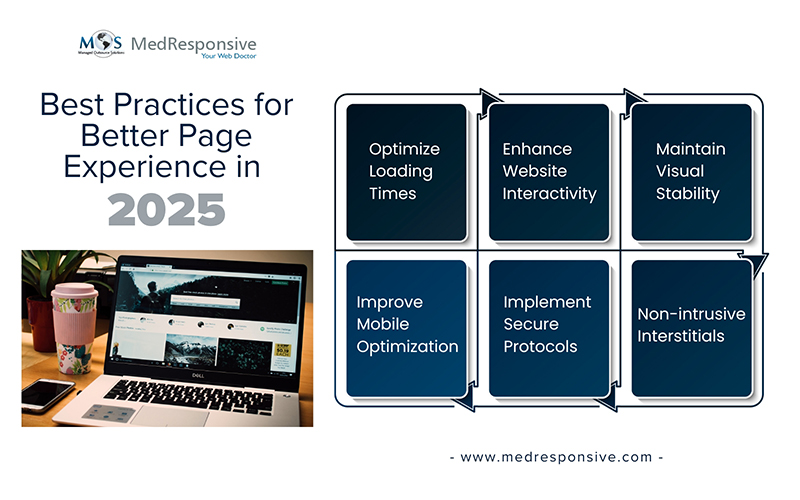65% of all web traffic comes from mobile devices.
Yet, 96.55% of all web pages receive ZERO search traffic from Google!
How’s that even possible?
This would be the first question that popped up in your mind, while reading these mind-numbing stats. Yet, it is true. The majority of websites receive no traffic and they are forever lost in the deep, infinite crevasses of cyberspace.
We live in an era where internet presence is paramount and these numbers point to a critical question: Is your website optimized to deliver the ultimate page experience in 2025? Why is it important? Because, understanding the Google Page Experience 2025 update is ever the more important for maintaining and enhancing your website’s SEO performance.
Let’s dive in.
What Is Page Experience?
Page experience basically refers to a set of signals upon which users perceive their interaction with a given web page. It is a systematic evaluation of the user’s overall experience with the website regarding visual stability, loading performance, mobile-friendliness and safety. It serves a vital aspect of SEO, with Google’s unwavering commitment to providing high-quality and user-centric content.
Page Experience Update – The Evolution
Google explicitly started using the term, ‘page experience’ in the updates from 2021, as earlier, page experience was something that had an indirect impact on SEO rankings. However, it then rose to prominence, by having a direct impact on ranking factors for Google.
In this update—which was released in 2021 and last updated in 2023—they explain how the search engine giant has prioritized content and user-friendliness, which was measured by looking into several key metrics that later came to be known as Core Web Vitals.
How to Improve Core Web Vitals in 2025
Core Web Vitals (CWV) is what Google utilizes to judge the user experience of a page effectively. The metrics that contribute to page experience in Google’s algorithm are:
- Largest Contentful Paint (LCP): This metric measures the loading performance. It measures the loading time of the largest element on the page. An ideal LCP score should be within 2.5 seconds of when the page first starts loading.
- Cumulative Layout Shift (CLS): This criterion evaluates the visual stability of the webpage. It particularly looks for shifting of elements on the page and if it does, it could make for a worse user experience.
- Interaction to Next Paint (INP): This metric measures how much time it takes between a user action (for e.g. a click) and the website’s response. This replaces First Input Delay (FID).
These metrics are an indispensable asset for understanding and enhancing user interaction with the website. The June 2024 Chrome User Experience (CrUX) report showed major enhancements in overall website performance scores, demonstrating the positive changes in how websites perform.
Other Factors That Influence Page Experience
- Mobile Responsiveness: With the majority of internet users now coming through mobile devices, responsive design is ever more important. Google prioritizes dynamic CSS that is compatible across all devices, moving away from separate mobile sites.
- Secure Browsing: Security has become the topmost priority for online users. Therefore, HTTPS has become mandatory, with HTTP Strict Transport Security (HSTS) recommended for extra security, thereby building trust and credibility.
Best Practices for Better Page Experience in 2025
As we are heading forward into 2025, the digital landscape is in a constant evolution process with advancements like AI-powered search experiences. Now, with Google’s integration of generative AI, it will revolutionize search results by offering dynamic and structured layouts. Therefore, a positive page experience becomes even more critical in such a scenario. The success of a website will be purely dependent on their adaptability in prioritizing user experience, thereby maintaining visibility and engagement.
- Optimize Core Web Vitals: Conduct routine monitoring to identify errors and improve LCP, CLS, and INP scores using Google’s PageSpeed Insights. Ensure server-side rendering and optimize JavaScript to boost performance.
- Improve Mobile Experience: Adhere to mobile-friendly web design principles, which would enable the website to function flawlessly across all devices. Regularly test the site’s mobile utility and make relevant modifications to the layout and content.
- Validate Safety: HTTPS implementation across the website helps protect user data and maybe even use HSTS to enforce secure connections, thereby building trust with your audience. Ensure timely updating of security certificates to identify any holes in the system.
- Avoid Intrusive Elements: Keep a strong check on the use of pop-ups in the website as it may obstruct the content. Ensure to stick to the process to provide a cleaner and more enjoyable user experience.
Why Collaborate with MedResponsive for SEO Supremacy?
It is not a cakewalk to navigate the technical/strategical complexities of SEO and stay updated with algorithm changes at the same time. Being an expert search engine optimization company, we specialize in optimizing websites to meet Google’s Page Experience standards.
- Expertise in the Latest SEO Trends: We have an expert, dedicated SEO team in level with the current updates, ensuring your website remains among the top, even in such a competitive landscape.
- Tailored Strategies: We do not work the same with everyone. We understand your requirements and customize our SEO services to meet your professional goals, with a focus on improving user experience and enhancing search rankings.
- Proven Results: Our exclusive clientele speaks for itself. We have an envious track record of unparalleled excellence, as we help businesses achieve their SEO goals through effective strategies.
In conclusion, understanding and implementing the principles of Google Page Experience 2025 update is vital for SEO success. Give priority to user-centric metrics and adhere to the above-mentioned best practices to improve your website’s performance, gain user satisfaction, and boost your overall search engine rankings.





